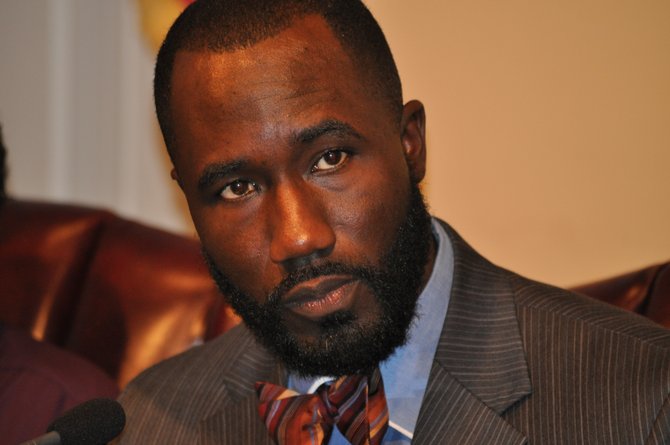Council President Tony Yarber of Ward 6 said he saw no data that show city curfews work. He said he was excited to hear that the current city council is interested in entertaining the ACLU's ideas. Photo by Trip Burns.
Most of the Jackson City Council's Planning Committee agrees with local ACLU leaders that a city curfew that sends youth violators to jail is a bad idea.
Planning Committee Chairwoman LaRita Cooper-Stokes brought the curfew back into discussion. Her husband, Kenneth Stokes, has long been a youth-curfew proponent and proposed re-adopting the city's former curfew, which expired June 29, 2010. The ordinance has been in the Planning Committee ever since.
Legal Director Bear Atwood and Program Director Nancy Kohsin-Kintigh of the Mississippi ACLU both spoke at the Planning Committee Thursday morning. Kohsin-Kintigh said minors have the right to be out anytime of night, just like adults do.
"I understand parents are frustrated, but so are young people. There's nothing to do. There's no places for them to go," Kohsin-Kintigh said. "If we created that space, we will see some very positive things coming out of that."
Cooper-Stokes' only reaction to Kohsin-Kintigh's comments was to ask Kohsin-Kintigh if she has any children, to which she answered, "No."
Council President Tony Yarber of Ward 6 said he saw no data that show city curfews work. He said he was excited to hear that the current city council is interested in entertaining the ACLU's ideas.
Yarber was glad Cooper-Stokes brought the curfew up, not so the council could reenact it, but so they could find alternative solutions to youth being on the street with nothing to do at night. He said the city needs to redirect some funds to address the problem. He and Ward 5 Councilman Charles Tillman have been researching the city opening an activity center to take children instead of jail. An even more proactive approach, Yarber said, would be opening activity centers to give all children a fun, safe place to go at night.
"We send a little over $1.2 million (to the county) every year to fuel the juvenile-justice piece that we have," Yarber said, adding that some of that money should go into athletic, arts and other programs for children. That would be true pro-activity on the part of the city in preventing youth crime, Yarber said.
Atwood wants to see the city include parent support services and discussions with youth and parents to the solution process. She said the answer isn't just getting children off the streets, because then they'll just act up at home.
"(Parents) are in a tough situation," Atwood said. "I really hope that we'll bring parents into the conversation."
Deputy City Attorney James Anderson said the city cannot enact a curfew right now, because the Henley-Young Juvenile Justice Center is under a state and federal consent decree for violations of housing youth offenders of ordinances like curfews with criminals who are in custody for crimes such as murder or burglary.
Under the consent decree, the city cannot create any new conditions that will send juveniles to Henley-Young. Since the curfew has expired, re-enacting it would qualify as a new condition, Anderson said.
There are also problems with creating another facility to house juveniles who violate a curfew, Anderson said. Youth Court Judge William Skinner would have to approve a new facility to house curfew violators and the city would have to worry with many levels of state and federal requirements for the facility.
The Planning Committee will discuss the curfew at a public meeting at City Hall Oct. 25 at 6 p.m. The next Planning Committee meeting is scheduled for Oct. 29 at 3 p.m.



Comments